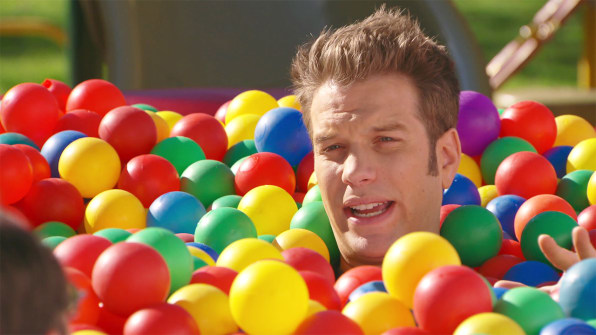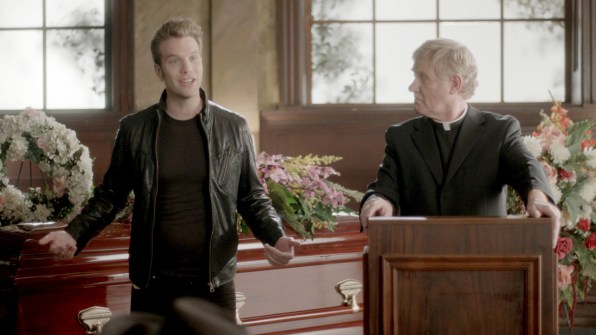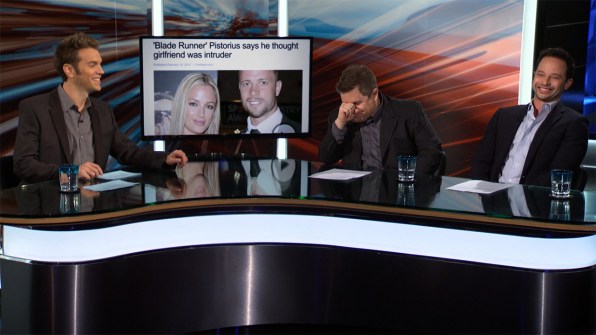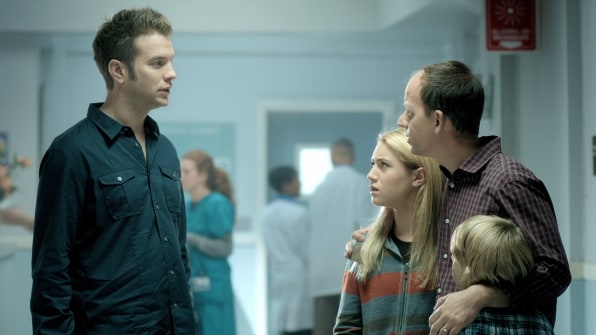How to Talk to Anyone (Junior Talker #5) by DeYtH Banger (you can read anyone TXT) 📖

- Author: DeYtH Banger
Book online «How to Talk to Anyone (Junior Talker #5) by DeYtH Banger (you can read anyone TXT) 📖». Author DeYtH Banger
Most mothers suggest that if you don’t have anything nice to say, don’t say it at all. The more modern advice, however, might be: If you don’t have anything nice to say, at least be funny when you’re saying it.
Anthony Jeselnik has nothing nice to say about anything. His persona is that of an arrogant prick, constantly airing grievances and confessing evil deeds. Frequent targets of abuse include family members, small children, and any woman with the misfortune of being one of his girlfriends. Through sheer commitment to character, though, and a deep respect for old-school joke crafting, Jeselnik has elevated “being a dick” to an art.
While the comic mostly sticks it to those in his own sphere during stand-up shows–and fellow comics in his beloved appearances on roasts–he takes out his animosity toward the world at large in his Comedy Central show, The Jeselnik Offensive, which has just been renewed for a second season. The former Late Night With Jimmy Fallonwriter chafed against the kind of news-based jokes he had to write on that show. Now, he has his own outlet dedicated to rants about the horrible things he finds most interesting.
Of course, nobody gets laughs merely by saying horrible things. There’s a certain finesse to it–a strategy built on misanthropy–of which Jeselnik is the undisputed master. The cranky comedian recently shared with Co.Create the tricks to cracking jokes by being a jerk.
APPEAL TO YOUR AUDIENCE’S DARK SIDE.
I found it was tough to get people to laugh at the kind of absurd one-liners I was telling when I first started out. But once I’d written a joke where the twist at the end was mean, the reaction was so much bigger. It was just guttural. That was a lightbulb moment for me, and I thought everything should have a mean twist. I think the biggest laugh is when someone laughs at something they don’t think they should be laughing at. It’s just a different kind of laugh, and that’s the only laugh I want from an audience.
DESENSITIZE THROUGH QUANTITY.
Everything I say is mean, so that makes everything less mean. If I’m up there talking about relationships and making fun of milkshakes and then all of a sudden I have a rape joke, it would make it seem that much more awful. If everything is rape and death, then it takes the pressure off of those things. People can feel a little better about laughing at something awful when it’s surrounded by other horrible things.

SMUGGLE MEAN IN WITH THE HUMOROUSLY TRAGIC.
When I wrote for Fallon, my favorite stories were the more tragic ones that people could still make fun of. Like when the inventor of the Frisbee dies. It’s a chance to make a funny, silly joke about that, but it was also making fun of someone who just died. Those things were great to me. Somebody dies in Florida because they drank too much bleach? That’s the kind of stuff that I love.
GO AHEAD AND OFFEND PEOPLE; THEY’LL GET OVER IT.
People always say “Oh, that offends me,” like it’s something that matters. Being offended doesn’t hurt you. Nobody’s ever gotten hurt by being offended–they’re just offended for a little bit, and then they get over it. There’s a guy from New Zealand who was demanding an apology from me for this shark bit I did on the show recently. And I couldn’t care less. I would never apologize for anything. He’ll forget about it in a week. It doesn’t matter. He doesn’t know who I am. The criticism was “How can you make fun of New Zealand sharks when you wouldn’t make fun of 9/11 or Newtown?” I’ve made fun of both of those things a few times on the show.

BE MEAN FOR THE RIGHT REASONS.
I don’t feel bad making fun of a tragedy because it already happened. It’s over, so why not joke about it now? People might even appreciate it. Laughing after a tragedy takes the power away from it. And that power always goes away. Any tragedy is tragic forever, but one day it suddenly becomes okay to make an Aurora joke or a joke about Gabby Giffords. It depends on why you’re making the joke. Are you trying to get attention for yourself? Or are you really trying to make people laugh at something. I think one is more noble than the other.
PEOPLE LIKE BEING INSULTED…. SOMETIMES.
I like being insulted, if it’s a good insult. There’s something about not taking yourself seriously that’s really fun. Especially if someone’s good at it. When Jeff Ross makes fun of me, I laugh every single time. It’s almost like a badge of our friendship. If I know that he worked hard on a joke for me, it makes me love him. When some idiot on the street makes fun of me, I don’t appreciate it as much.

USE “THIRD THOUGHT” TO MAKE MEAN TWISTS SURPRISING.
If I give you the setup of a joke, a punch line might pop in your head right away. That’s the first thought. But if your punch line is the first thought, nobody’s going to laugh at it because they’ve all already thought of it. If you sit there and think about what else might happen–the second thought–that could be an okay joke. But the third thought is where you really blow people away, because it’s something that they would have put together eventually, but it takes a while. When you look at a premise, just think about what the smartest take on it would be. Ask yourself, “What haven’t I heard before?”
THE BIGGER THE TENSION, THE BIGGER THE RELEASE
Being shocking is like working with a different kind of canvas. I’m painting, just like everybody else, but there’s something about having that shocking or taboo word in there that amps up the tension. Sometimes the punch line is something offensive, sometimes the setup is offensive—where it just makes people uncomfortable. That’s when you can really pull the rug out–because they’re looking one way. You build up the tension and then release the tension, and everybody laughs. I just think you get a bigger laugh when you’re talking about offensive subjects.
There’s shock comedy where all you’re really doing is saying AIDS at the end of a joke. And then there’s comedy that’s talking about AIDS but has a smarter twist to it and that helps me get away with a lot. The joke would stand on its own, even if it wasn’t talking about abortion or something.

PRETEND THERE’S NO LINE (BECAUSE THERE ISN’T ONE).
There’s no line. Comedy can go anywhere, as long as you can make it funny. There’s a Laurence Olivier quote: “There’s no such thing as overacting.” You can go as big as you want; you just have to fill up the space—you have to see the character get to that moment. So you can talk about anything horrible, you just have to build to it, or put it in a context that makes sense. Where people might say, “Oh, you definitely can’t make fun of that,” all that interests me is trying to make those things funny. People probably have their own lines, but my job is to push that line as far as I can or obliterate it completely and make somebody laugh at something they never thought they’d be able to laugh at. I’m not trying to give the audience what they want; I’m trying to give the audience what I want, and make it palatable.
Dara Ó Briain: ‘I’d like to maintain this plateau’
The comedian has reached an enviable point in his career where he is happy to continue doing what he’s been doing. But he’s no less irritable or interesting for that

Dara Ó Briain is hungover. Sitting in a hotel room in Dublin, the previous night was spent at the premiere of Noble. “I would characterise this interview as being slightly hungover. Not quite as coherent, or as on the nail. Eh, there’s a struggling for the words here and there. So, sorry about that.”
Despite the woolly head, he’s animated and full of chat. His upcoming stand-up show, Crowd Tickler, is bound to be another success. There’s something very solid about Ó Briain. He’s smart. There’s an edge to his opinions, a quickness, and a dexterity of intelligence that suggests you could throw any topic at him and he would probably form an enlightening and enlightened point of view on it.
The narrative is well-known now: from Coláiste Eoin on the Stillorgan dual carriageway, he went up the road to UCD, excelled at debating and eventually veered towards comedy. Like the best comedians, Ó Briain isn’t just about the gags. If he was in a journalist’s contacts book, you could call him for a line on a bunch of topics: science, maths, Irish man-in-London syndrome, video games, the Irish language, and, oh yeah, comedy.
Running away with the circusWhen did he realise that performance was a thing? “That’s a very good way of putting that question,” he says, poking fun at the inevitability of it. “The traditional way of asking it is: when did you first realise you were funny? A version of that question gets asked so often that Ardal [O’Hanlon] had a standard answer, which was, ‘The government sent me a letter when I was 11’, which I think is a fantastic stock response.”
His actual answer is: in university, attending debates and admiring that skill, “envy being a great driver at times”. He came up with some gags for a debate about the presidential election in 1990 and they got a huge round of applause. “This weird spike went off in a part of me I didn’t even know was waiting to receive that jolt. Bloody hell.”
He considered being a barrister, that being the more traditional path given the notion of doing stand-up in Ireland in the 1990s was a bit out-there. “It was as exotic as: I will run away to the circus.” He goes on a tangent about people on unicycles, and acts out people flinging knives at a woman rotating on a board.
Being at the helm of Mock the Week probably gives him a better perspective on the tropes and trends that come and go in comedy. He’s not a fan of cliches, like the one about comedians and depression, which gets asked all the time, “much as I’m sure if you’re a female comedian you get asked: what’s it like being a female comedian? We all get asked about depression. But we all know people who have actually had depression. Do you see them do many gigs? Do you see them going, ‘I want to go on stage and tell jokes or write jokes’? Nobody ever goes, ‘Your teeth look fantastic’. ‘Well, the best dentistry comes from a very dark place . . .’ ”
Another thing that bores him are stand-up routines about the song Blurred Lines, “because now this is the badge that people are quick to assert, their feminist credentials at the moment – male comedians, by the way,” he clarifies, quick to say that female comedians doing great feminist routines are totally separate to this. It happened with science too, when that became a common stand-up topic. “I don’t do it [the feminist stand up cliche] because I felt it’s slightly irritating. When science was the kind of thing for people to drop in, I was slightly, ‘Well, where were you all when I was in UCD actually doing this stuff?’ I’ll spare the patronising male attempts at doing a feminist routine now, out of the sheer professional courtesy that I found frustrating when people suddenly all decided they were into science.”
Last year, Ó Briain said something quite nuanced about the issue of gender balance on the type





Comments (0)